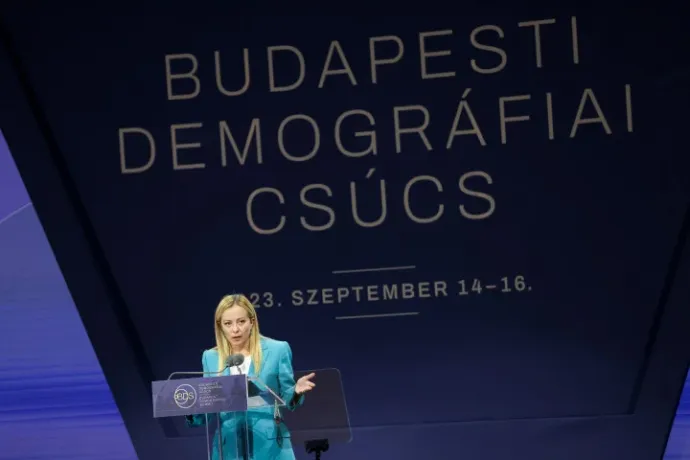
The Demographic Summit, heralded as "the biggest international forum of pro-family forces", is being held for the fifth time in Budapest. For the Fidesz-led Hungarian state, the event has an important function: in essence, it provides a diplomatic framework within which Prime Minister Orbán and his party can express their traditionalist views on the family, surrounded by foreign speakers. The event is partly disguised as a professional discussion, allowing them to berate the West, which they believe is dying, and the "LGBTQ lobby", which they claim is the cancer of our civilisation.
The motto of this year's event, held at the Museum of Fine Arts from Thursday to Saturday is "Family is the key to security", and the biggest political figures at the event include Italian Prime Minister Giorgia Meloni, the returning guest, Serbian President Aleksandar Vučić, as well as Bulgarian President Rumen Radev. No major US speaker was booked this year, although in 2021, Mike Pence, Trump's former vice-president was in attendance from the Republican side. As far as speakers from Fidesz this year, President Katalin Novák, Prime Minister Viktor Orbán and Defence Minister Kristóf Szalay-Bobrovniczky will be taking the stage. The latter could even be considered a strong message on what we need more demographic growth for.
Alongside the above, speakers include conservative influencers (like Canadian psychologist Jordan Peterson, a major critic of wokeism, and motivational speaker Nick Vujicic), several representatives of think tanks, religious leaders, and less prominent politicians (ministers from Kazakhstan, Azerbaijan, Ecuador, Bahrain, etc.). Nobel-prize winner economist James Hackman is likely the biggest professional name among the guests, having spent much time researching social inequalities and social mobility in the context of studying disadvantaged families. Unfortunately, Elon Musk, who is keenly interested in demographics – perhaps due to being personally affected – did not turn up, despite an invitation from President Novák.
The first keynote address was given by Jordan B. Peterson, who was introduced as a forerunner of free speech.
Among others, the Canadian psychologist spoke about how his practice has shown him that the nuclear family is the foundation of mental health and identity.
Families defending freedom
He was followed by the main speakers of Thursday's programme, among others Hungarian Prime Minister Viktor Orbán, Hungarian President Katalin Novák, and Italian Prime Minister Giorgia Meloni.
Katalin Novák took the stage first. The President, who has hosted the event from its launch, took the stage to loud ovations. Novák thanked fate for her and her husband's families and then congratulated her mother in law, whose birthday is today.

She said that at this event, "everything revolves around freedom", and freedom is something Hungarians are very used to, “although we have to fight for it again and again”. Novák said that "today we are fighting for the freedom of families", but anyone who lives in a family understands that freedom only exists within a particular order. She had her children during Hungary's "anti-family period", when Hungarian families seemed to have given up on the future, but then they started a fight for freedom. Today, however, we live in a country where families are getting all the help they need, the President said, and then listed the demographic achievements of Fidesz governments.
She added that at the same time, she believes the world has again entered a dangerous period, which could usher in a demographic ice age. Moreover, if we do not take care of our values, we will voluntarily sacrifice ourselves before we get there, "but the freedom fighter families will not relent", they will take back the values and the mocked principles of law.
Finally, to resounding applause from the audience, Novák read out the "12 demands of families", which included: demanding that children should have the right to grow up with the same gender they were born with, that there should be no financial obstacles to having children, that attention should be paid to (Hungarian – TN) families living beyond the country's borders, and that the elderly should be respected.
The Italian government admires the Hungarian results
As the leader of a G7 country, Italian Prime Minister Giorgia Meloni – is the highest-ranking foreign guest at this year's event. She spoke of the demographic disaster affecting Italy (the country with one of the lowest fertility rates in Europe), which is also affecting the rest of the world and has long historical causes, according to her. She said that the recent decades have seen an "extremely anti-family climate", even though children are an essential element of social well-being. As Meloni sees it, the developed countries are on an accelerated path to demise, and the big question facing all nations is how to tackle this.

She believes Hungary is the perfect example of what rich Western countries should do: mobilise their resources for the benefit of families. She believes that it is possible to reconcile having children and a career for women, and that Hungary has the means to do this through its family-friendly policies.
Meloni also mentioned the 1956 Hungarian War of Independence, after which the Russians "tried to rewrite history", and she said that we must not allow them to do the same to Ukraine today. The Italian Prime minister said that a Europe united as one family will be capable of achieving these results.
Orbán: the fight for children is not decided in our pockets, but in our heads
The final speech of the panel was delivered by Viktor Orbán. The main point of what he said was that
liberals have hacked the old framework of thinking at the strategic and anthropological level.
They have disseminated the view that the individual is the most important, they consider anyone who restricts their individual desires a tyrant, even though the restriction also serves as form of support, the Prime Minister said.
Orbán sees the creation of "irrational fears" as a new kind of liberal tool, which creates a problem at the strategic level. He said that one of their methods is to make people believe that life must be subjugated to an inevitable end of the world, which reminds Orbán of Marxist class struggle theory.
The Orbán governments and demographics in reality
Demographic policy has been one of the top priorities of the Fidesz governments since the very beginning. In the early 2010s, the Orbán government set itself the ambitious goal of turning Hungary's fertility rate into a positive one, i.e. aiming for women to have at least two children on average during their lifetime. In statistical terms, this is a figure of 2.1, which demographers say is an unimaginable rise from the initial figure (at its lowest point in 2011, the total fertility rate was 1.26), and such a radical turnaround has not been achieved through population policy anywhere in the Western world.
In recent years, the Hungarian state has spent heavily on family policy. In relation to GDP, Hungary has become a world leader in the amount spent on this goal.
The fertility rate indeed gradually climbed to 1.59 by 2021, but then dropped again slightly last year to 1.52. This, however, was still not sufficient to stop the population decline, as a more populous cohort of women have meanwhile passed childbearing age, and members of another populous group, the older ones continue to die year after year.
For Fidesz, however, perhaps more important than the tangible results, is the issue of demographics as an element in culture wars and being the leading voice in the so-called family-friendly international camp (which in practice means countries with a staunchly right-wing leadership).
For more quick, accurate and impartial news from and about Hungary, subscribe to the Telex English newsletter!